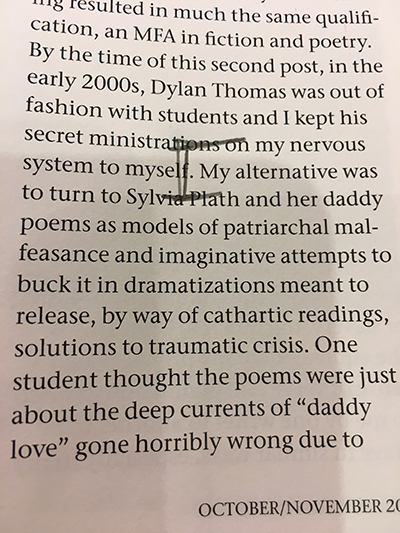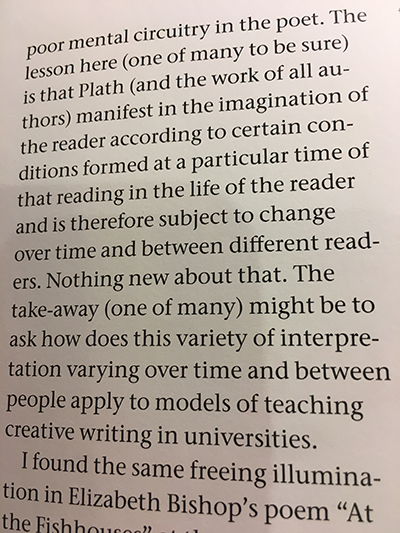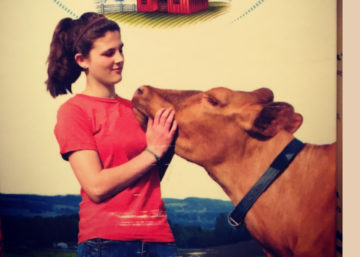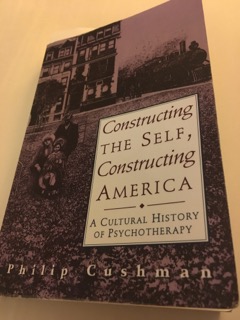‘What difference does it make,’said the dervish, ‘if there is good or evil? When His Highness sends a ship to Egypt, does he worry about whether or not the mice are comfortable on board?’
Voltaire, Candide
I think I am the last person on earth to find out that Sylvia Plath was an incest survivor. I read The Bell Jar, yes, but maybe she didn’t spell it out? Did she? I read The Bell Jar a long time ago . . . circa 1988. Maybe I need these things spelled out. The light bulb went off for me in December, when I read an article in a lit journal.


(those are from the Writer’s Chronicle, “Towards a New Creative Writing Pedagogy” by Fred D’Aguiar)
Somehow when I read these little bits of goodie, it hit me that Plath was a trauma victim, and an incest survivor.
So she didn’t just stick her head in the oven for artistic reasons.
Except maybe trauma is the original artistic reason?
I never considered myself an expert on Plath, but I did memorize the poem “Daddy.” I used to go around chanting it to myself.
you do not do
you do not do
anymore black shoe
in which i’ve lived like a foot
barely daring to breathe
or achoo
see?
that’s from memory. but i didn’t fully understand the poem. obviously. didn’t want to?

Another favorite book at the time for me was Sybil, immortalized in the made-for-TV movie by Sally Field, who portrayed the “multiple personalities” with hair and wardrobe changes. ROLE OF A LIFETIME, until Forrest Gump of course. Researchers have since suggested that we all have multiple personalities, more or less.
Here are Sybil’s selves, as laid out on the Wikipedia page for the movie.
Peggy: A nine-year-old girl who believes she is still in the small town in which Sybil grew up. Peggy holds the rage Sybil felt at her mother’s abuse and frequently expresses her anger through temper tantrums and breaking glass. Like many of the selves, she enjoys drawing and painting. She fears hands, dishtowels, music, and the colors green and purple, all triggers to specific instances of abuse.
Vicky: A very sophisticated and mature twelve-year-old girl who is aware of all the other personalities and knows everything the others do, though Sybil does not. Vicky speaks French and claims to have grown up in Paris with many brothers and sisters and loving parents. The dominant personality and the only personality to undergo hypnosis.
Vanessa: A young, vibrant, red-haired girl about twelve years old, she is outgoing and full of “joie de vivre”. Falls in love with Richard and helps Sybil build a relationship with him, until he moves away.
Marcia: A young girl obsessed with thoughts of death and suicide, who tries to kill herself (and thus Sybil) on several occasions. Dresses in black.
Ruthie: A preverbal infant. When Sybil is extremely frightened, she regresses into Ruthie and cannot move or speak.
Mary: Named for and strongly resembles Sybil’s grandmother. When Sybil’s grandmother (the only person Sybil felt loved her) died, Sybil was so bereft that she created Mary as an internalized version of Grandma. Mary speaks in the voice of an old woman and frequently behaves as one.
Nancy: A product of Sybil’s father’s religious fanaticism, Nancy fears the end of the world and God’s punishment.
Clara: Around 8–9 years old. Very religious; critical and resentful of Sybil.
Helen: Around 13–14 years old. Timid and afraid, but determined “to be somebody”.
Marjorie: Around 10–11 years old. Serene and quick to laugh, enjoys parties and travel.
Sybil Ann: Around 5–6 years old. Pale, timid and extremely lethargic; the defeated Sybil.
Mike: A brash young boy who likes to build and do carpentry. He builds bookshelves and a partition wall for Sybil’s apartment, frightening her badly when she doesn’t know how they got there. He and Sid both believe that they will grow penises and be able “to give a girl a baby” when they’re older.
Sid: Younger and a little more taciturn than Mike, he also enjoys building things, as well as sports. Identifies strongly with Sybil’s father and wants to be like him when he grows up.
That’s 13. It seemed like a lot when I first read the book.
Now 13 seems like a round, reasonable number.
I think it was suggested or even proven later that the therapist, Flora Rheta Schreiber, who made a killin’ off the book and the movie, was in some way exploitative. Beyond just making a killin’. I think Schreiber was accused of making shit up?
Another illuminated mass-market paperback I loved in my early twenties was Will There Really Be A Morning?. That’s the autiobiography of actress Frances Farmer, who was awarded with a partial lobotomy for her emotional excesses.
On that note, the next book on my desk:

Digging into the ups and downs of therapy and therapists. There’s an anti-psychiatry movement on the rise, and an anti-diagnosis movement. But I don’t know enough about it to say much here. I can tell you that I’ve known a few therapists in my day. I can tell you that. Both from the couch and just in my day-to-day ramblings. I’m not married to one, though. And neither of my parents was a psychiatrist, psychologist, or psychoanalyst. We had other problems.
One last link, further reading on Job if that appeals to you. Oh, Jobbie. Poor thing.
Misery: Is there Justice in the Book of Job?
